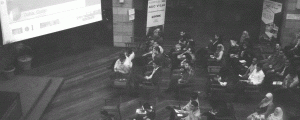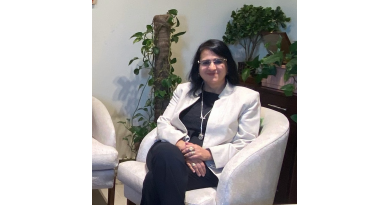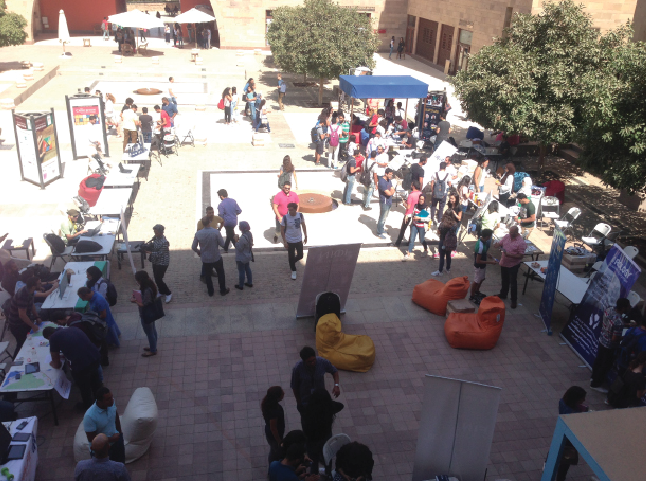Arab Startup Competition kicks off online
Sunday November 3, 2013
BY DEENA EL SAFTY
Connecting speakers online from 20 Arab cities simultaneou sly marked the launch of the seventh Arab Startup Competition in an event held at AUC on Monday.
sly marked the launch of the seventh Arab Startup Competition in an event held at AUC on Monday.
The competition is organized by the Pan Arab Region branch of the Massachusetts Institute of Technology Enterprise Forum (MITEF) in partnership with Abdul Latif Jameel Community Initiative, which aims at promoting social change.
The online launch of the competition took place simultaneously in 20 cities including Cairo, Beirut, Jeddah, Kuwait, Tunis, Riyadh and Dubai, among others.
“This is about building a business, creating value and making an impact,” said Ford Tamer, a serial entrepreneur who builds a number of successful businesses with more than 25 years of experience in technology startups.
The competition, which attracts over 5,000 applications, includes three categories: Idea, Startup, and Global. The Idea category is for entrepreneurs who want to take their ideas to the next level by creating a prototype – a preliminary version of a device.
The Startup category is for teams who want their product to be incubated and enter the market. The Global level is for teams who are already established in the market but need to raise more funds.
Tamer said that in order for a business to be successful, entrepreneurs must follow six L’s: Learn, Leave your ego at the door, Leapfrog and Innovate, Lead, Leverage and Love.
“A culture of constants learning is essential,” said Tamer while explaining that the learning phase keeps you up-to-date with what your costumers want and need.
He added that the second “leave your ego” phase is the most difficult; it is not about who owns what in the company, but how they work together as a whole.
The third “leapfrog and innovate” phase is about setting high expectations for yourself and your team. The fourth “lead” phase refers to how each employee must feel like a leader in a way – creating a “leader-leader culture.”
The fifth “leverage” phase is about how each member helps in building a better team, said Tamer comparing a business company to a soccer team where each player plays a vital role towards the end result.
“Love,” the last phase, is about having fun and celebrating achievements no matter how small they are.
“A philosophy I believe in … is using speed as a weapon for startups,” said Michael Cassidy, serial entrepreneur who won the $50,000 MIT entrepreneurship competition twice.
Cassidy recommended what he called the “lightning speed startup timeline,” a strategy which he described as the key to quick success. Cassidy said it should take teams two weeks to develop their idea, one day to raise money, two weeks to hire employees and open an office, and three months to build the product.
He added that this strategy will keep entrepreneurs ahead of the competition at all times. Moving quickly attracts more press coverage and builds stron team morale, he added.
“The amount of energy we got after we won was huge, it kept pushing us for three months after,” said Omar Gabr, last year’s MITEF winner and co-founder of mobile application Instabug, a tool for mobile developers that detects and helps users report bugs in applications.
Gabr said that the $50 thousand competition award helped their team become stronger after solving their financial problems. The award granted Gabr’s team with global recognition and more awards; meeting with companies like Google and Facebook.
Entrepreneurs look for products that might actually help people with their lives, said Sandy Herz, head of strategic partnership for the Skoll Foundation that incubates social entrepreneurs and helps them create a useful product.
Herz said that she was a very successful investment banker making billion-dollar deals, while there were many problems in New York and a lot of beggars on the street. She said that this wasn’t the story she wanted to tell her children; she wanted to do something that would actually touch people’s lives and make a change.
“To me, it felt like I was rearranging death chairs on the titanic,” said Herz who left her job, got a degree in social change and created a non-profit foundation to help entrepreneurs put their ideas to life. Helping people makes one proudest, Herz added.



